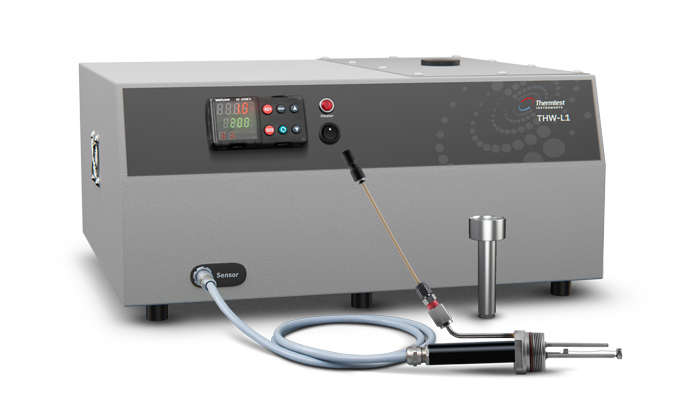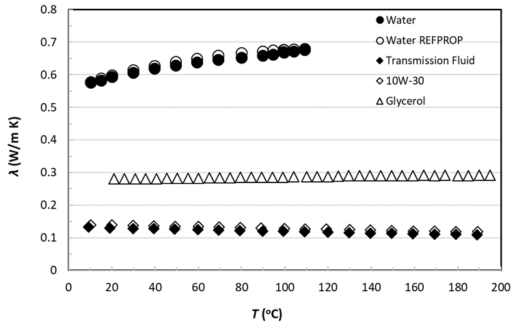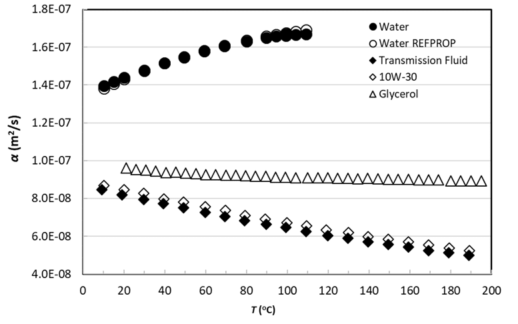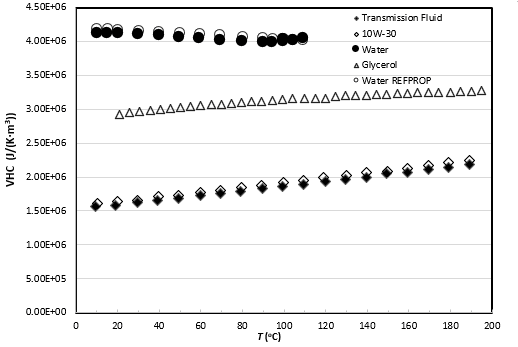The Transient Hot Wire Liquid Thermal Conductivity Meter (THW-L1) is a precision analytical instrument for directly measuring the thermal conductivity, thermal diffusivity and specific heat of liquids and low viscosity pastes, from -150 to 300°C. The THW-L1 is available in three models:
| THW-L1 | THW-L1S | THW-L1E |
|---|---|---|
| 10 to 200°C | -50 to 200°C | -100 / -150°C to 300°C |

Picture 1. Thermtest THW-L1 Liquid Thermal Conductivity Meter
The THW-L1 Meter was designed with speed and operational simplicity in mind. With a single measurement of 1 second in duration, small volumes of liquids and low viscosity pastes can be accurately and precisely measured for thermal conductivity, thermal diffusivity, and specific heat. The THW-L1 Meter uses a non-stationary measurement approach and rapid test times, limiting convective effects for samples with a wide range of viscosities (0.1 to 10,000,000 mPas).
The Transient Hot Wire (THW-L1) Liquid Thermal Conductivity Meter is an thermal conductivity equipment for direct determination of the thermal conductivity, thermal diffusivity, and specific heat instrument for measurement of liquids and pastes in accordance with ASTM D7896-19, from 10 to 200 °C. The THW integrated temperature platform with proprietary temperature control and high uniformity of temperature allows isothermal measurements through the whole operation range.
To demonstrate the performance of the device, the following sample fluids were tested with THW-L1 for thermal conductivity (λ) and thermal diffusivity (α) values: glycerol, 10W-30 oil, transmission fluid and water. Throughout the experiment, the temperature of the fluids ranged from 10 °C to 200 °C.
THW-L1 tests for the thermal conductivity and thermal diffusivity of fluids with precise accuracy. The knowledge of the thermal conductivity & diffusivity of liquids can have practical applications. For example, within the automobile industry it can help for making a better selection of suitable oil. Water, Glycerol, 10W-30 oil and transmission fluid are highly used fluids in everyday life.
Glycerol is typically used in production phase of the automotive industry. 10W-30 is a highly viscous engine oil available for commercial use. Transmission fluid is a common lubricant for automobiles. Lubrication oils are used in engines to prevent corrosion of the engine parts and to reduce the wear on the moving parts. Accurate knowledge of the thermal conductivity of oils can result in less operation costs to maintain the engine of automobiles.
Figure 1. displays the thermal conductivity measurements plotted along the y-axis and the corresponding temperatures plotted along the x-axis, for each of the four sample fluids using THW-L1. Figure 2. displays the thermal diffusivity measurements plotted along the y-axis and the corresponding temperatures plotted along the x-axis. For both Figure 1. & 2, ‘Water REFROP’ is plotted as a reference.
Water REFPROP is showing the standard thermal conductivity and thermal diffusivity values of water, without using THW-L1 thermal conductivity instrument for measurement. For both the thermal conductivity and the thermal diffusivity, the standard deviation between the measured water values and standard water values was found to be less than 2 %.
The measurements of the sample fluids were taken with a pressure of 20 psi. Figure 3. below shows a plot of the Volumetric Heat Capacity [thermal conductivity (λ) / thermal diffusivity (α)] plotted along the y-axis and the corresponding temperatures plotted along the x-axis, which has been calculated from the THW-L1 measurements.

Figure 1. The thermal conductivity values of water, transmission fluid, 10W-30 and glycerol plotted with respect to temperatures ranging from 0oC – 200oC. (Plot includes Water REFPROP, for reference, which displays the standard thermal conductivity values for water).

Figure 2. The thermal diffusivity values of water, transmission fluid, 10W-30 and glycerol plotted with respect to temperatures ranging from 0oC – 200oC. (Plot includes Water REFPROP, for reference, which displays the standard thermal diffusivity values for water).

Figure 3. The Volumetric Heat Capacity values of water, transmission fluid, 10W-30 and glycerol plotted with respect to temperatures ranging from 0oC – 200oC. (Plot includes Water REFPROP, for reference, which displays the calculated VHC of water using the standard thermal conductivity and diffusivity values).